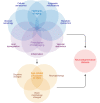Biological aging processes underlying cognitive decline and neurodegenerative disease
- PMID: 35575089
- PMCID: PMC9106343
- DOI: 10.1172/JCI158453
Biological aging processes underlying cognitive decline and neurodegenerative disease
Abstract
Alzheimer's disease and related dementias (ADRD) are among the top contributors to disability and mortality in later life. As with many chronic conditions, aging is the single most influential factor in the development of ADRD. Even among older adults who remain free of dementia throughout their lives, cognitive decline and neurodegenerative changes are appreciable with advancing age, suggesting shared pathophysiological mechanisms. In this Review, we provide an overview of changes in cognition, brain morphology, and neuropathological protein accumulation across the lifespan in humans, with complementary and mechanistic evidence from animal models. Next, we highlight selected aging processes that are differentially regulated in neurodegenerative disease, including aberrant autophagy, mitochondrial dysfunction, cellular senescence, epigenetic changes, cerebrovascular dysfunction, inflammation, and lipid dysregulation. We summarize research across clinical and translational studies to link biological aging processes to underlying ADRD pathogenesis. Targeting fundamental processes underlying biological aging may represent a yet relatively unexplored avenue to attenuate both age-related cognitive decline and ADRD. Collaboration across the fields of geroscience and neuroscience, coupled with the development of new translational animal models that more closely align with human disease processes, is necessary to advance novel therapeutic discovery in this realm.
Conflict of interest statement
Figures

References
-
- Vincent GK, ed. The Next Four Decades: The Older Population in the United States: 2010 to 2050. US Department of Commerce, Economics and Statistics Administration, US Census Bureau; 2010.
-
- Alzheimer’s Association. 2019 Alzheimer’s disease facts and figures. Alzheimers Dement. 2019;15(3):321–387. doi: 10.1016/j.jalz.2019.01.010. - DOI
Publication types
MeSH terms
Grants and funding
LinkOut - more resources
Full Text Sources
Medical
Research Materials

